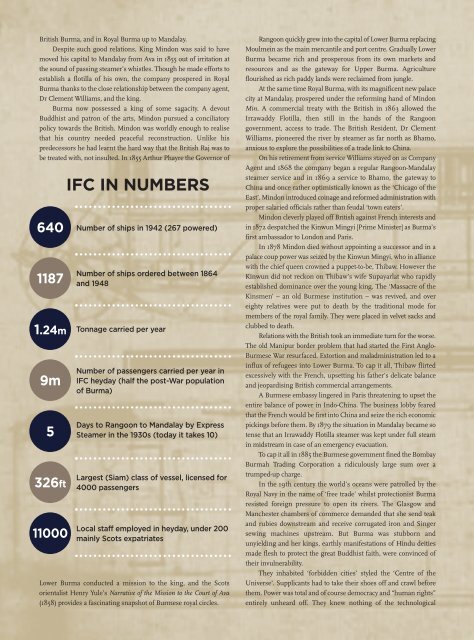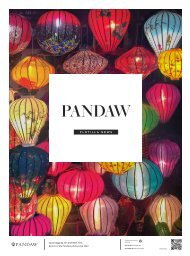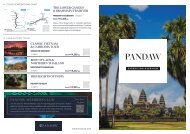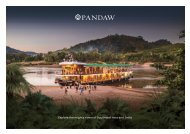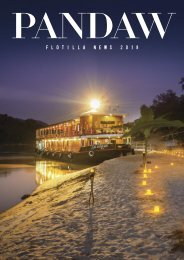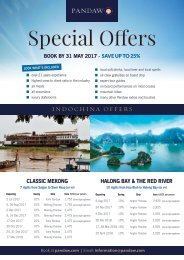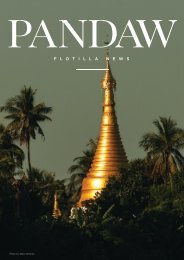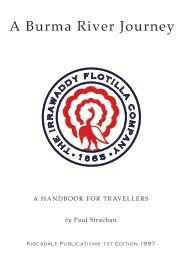Pandaw Magazine
Pandaw magazine 2016.
Pandaw magazine 2016.
Create successful ePaper yourself
Turn your PDF publications into a flip-book with our unique Google optimized e-Paper software.
British Burma, and in Royal Burma up to Mandalay.<br />
Despite such good relations, King Mindon was said to have<br />
moved his capital to Mandalay from Ava in 1855 out of irritation at<br />
the sound of passing steamer’s whistles. Though he made efforts to<br />
establish a flotilla of his own, the company prospered in Royal<br />
Burma thanks to the close relationship between the company agent,<br />
Dr Clement Williams, and the king.<br />
Burma now possessed a king of some sagacity. A devout<br />
Buddhist and patron of the arts, Mindon pursued a conciliatory<br />
policy towards the British. Mindon was worldly enough to realise<br />
that his country needed peaceful reconstruction. Unlike his<br />
predecessors he had learnt the hard way that the British Raj was to<br />
be treated with, not insulted. In 1855 Arthur Phayre the Governor of<br />
640<br />
1187<br />
1.24m<br />
9m<br />
5<br />
326ft<br />
11000<br />
IFC IN NUMBERS<br />
Number of ships in 1942 (267 powered)<br />
Number of ships ordered between 1864<br />
and 1948<br />
Tonnage carried per year<br />
Number of passengers carried per year in<br />
IFC heyday (half the post-War population<br />
of Burma)<br />
Days to Rangoon to Mandalay by Express<br />
Steamer in the 1930s (today it takes 10)<br />
Largest (Siam) class of vessel, licensed for<br />
4000 passengers<br />
Local staff employed in heyday, under 200<br />
mainly Scots expatriates<br />
Lower Burma conducted a mission to the king, and the Scots<br />
orientalist Henry Yule’s Narrative of the Mission to the Court of Ava<br />
(1858) provides a fascinating snapshot of Burmese royal circles.<br />
Rangoon quickly grew into the capital of Lower Burma replacing<br />
Moulmein as the main mercantile and port centre. Gradually Lower<br />
Burma became rich and prosperous from its own markets and<br />
resources and as the gateway for Upper Burma. Agriculture<br />
flourished as rich paddy lands were reclaimed from jungle.<br />
At the same time Royal Burma, with its magnificent new palace<br />
city at Mandalay, prospered under the reforming hand of Mindon<br />
Min. A commercial treaty with the British in 1863 allowed the<br />
Irrawaddy Flotilla, then still in the hands of the Rangoon<br />
government, access to trade. The British Resident, Dr Clement<br />
Williams, pioneered the river by steamer as far north as Bhamo,<br />
anxious to explore the possibilities of a trade link to China.<br />
On his retirement from service Williams stayed on as Company<br />
Agent and 1868 the company began a regular Rangoon-Mandalay<br />
steamer service and in 1869 a service to Bhamo, the gateway to<br />
China and once rather optimistically known as the ‘Chicago of the<br />
East’. Mindon introduced coinage and reformed administration with<br />
proper salaried officials rather than feudal ‘town eaters’.<br />
Mindon cleverly played off British against French interests and<br />
in 1872 despatched the Kinwun Mingyi [Prime Minister] as Burma’s<br />
first ambassador to London and Paris.<br />
In 1878 Mindon died without appointing a successor and in a<br />
palace coup power was seized by the Kinwun Mingyi, who in alliance<br />
with the chief queen crowned a puppet-to-be, Thibaw. However the<br />
Kinwun did not reckon on Thibaw’s wife Supayarlat who rapidly<br />
established dominance over the young king. The ‘Massacre of the<br />
Kinsmen’ – an old Burmese institution – was revived, and over<br />
eighty relatives were put to death by the traditional mode for<br />
members of the royal family. They were placed in velvet sacks and<br />
clubbed to death.<br />
Relations with the British took an immediate turn for the worse.<br />
The old Manipur border problem that had started the First Anglo-<br />
Burmese War resurfaced. Extortion and maladministration led to a<br />
influx of refugees into Lower Burma. To cap it all, Thibaw flirted<br />
excessively with the French, upsetting his father’s delicate balance<br />
and jeopardising British commercial arrangements.<br />
A Burmese embassy lingered in Paris threatening to upset the<br />
entire balance of power in Indo-China. The business lobby feared<br />
that the French would be first into China and seize the rich economic<br />
pickings before them. By 1879 the situation in Mandalay became so<br />
tense that an Irrawaddy Flotilla steamer was kept under full steam<br />
in midstream in case of an emergency evacuation.<br />
To cap it all in 1885 the Burmese government fined the Bombay<br />
Burmah Trading Corporation a ridiculously large sum over a<br />
trumped-up charge.<br />
In the 19th century the world’s oceans were patrolled by the<br />
Royal Navy in the name of ‘free trade’ whilst protectionist Burma<br />
resisted foreign pressure to open its rivers. The Glasgow and<br />
Manchester chambers of commerce demanded that she send teak<br />
and rubies downstream and receive corrugated iron and Singer<br />
sewing machines upstream. But Burma was stubborn and<br />
unyielding and her kings, earthly manifestations of Hindu deities<br />
made flesh to protect the great Buddhist faith, were convinced of<br />
their invulnerability.<br />
They inhabited ‘forbidden cities’ styled the ‘Centre of the<br />
Universe’. Supplicants had to take their shoes off and crawl before<br />
them. Power was total and of course democracy and “human rights”<br />
entirely unheard off. They knew nothing of the technological


